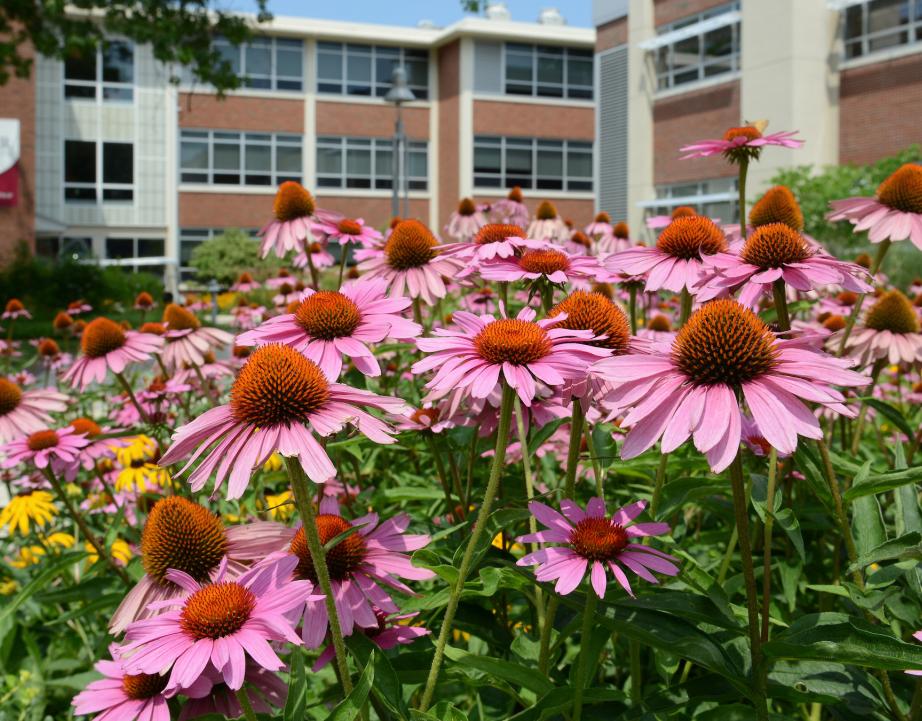Monday, Sep 25, 2017
For the eight-straight year, The Princeton Review has recognized Rider's commitment to the environment and sustainability by naming the University among the 375 most environmentally responsible colleges in its Green College Guide. “I am proud of the work that’s been done by my staff, committee and campus partners to keep Rider moving forward toward a sustainable future," said Melissa Greenberg, Rider’s sustainability manager. "This is a team effort that takes collaboration from various departments to make this placement in the Princeton Review possible. We are not only lessening our impact on the environment and saving money but educating our students about our impact as a university and their role, as well.” Rider was chosen based on data from the company's 2016-17 survey of hundreds of four-year colleges concerning their commitments to the environment and sustainability. "We strongly recommend Rider University to the many environmentally-minded students who seek to study and live at green colleges," said The Princeton Review's Robert Franek, senior vice president-publisher. Franek noted the growing interest the company has seen among college-bound students in green colleges. "Among more than 10,000 teens and parents who participated in our 2017 College Hopes & Worries Survey, 64 percent told us that having information about a school’s commitment to the environment would influence their decision to apply to or attend the college."
“Broncs Go Green” is the driving force for sustainability initiatives on Rider’s two campuses in Lawrenceville and Princeton, defined by the four R’s: reduce, reuse, refuse (the purchase of non-sustainable goods) and recycle. Rider’s Office of Sustainability leads the effort to establish a more environmentally aware campus. In addition to Greenberg, the office includes an Energy and Sustainability Steering Committee and a team of student Eco-Reps a volunteer “green team,” one of whom sits on the new Student Government Association Facilities Committee.
Greenberg has completed three greenhouse gas inventories and a carbon neutrality plan as well as given input on the sustainable features included in campus construction projects. These projects include a LEED Silver residence hall completed in March 2010; a LEED Gold academic building completed in July 2012; and a LEED Silver academic building completed in August 2014.
A guiding principle of Rider’s Energy and Sustainability Master Plan is to increase and strengthen student involvement. Students have the opportunity to apply for a job as an Eco-Rep or join the Rider Green Team. Students can also choose to take courses with an environmental focus and participate in research projects. Rider also offers a growing minor in sustainability studies, and students are encouraged by faculty to attend the successful Rider Green Film and Speaker Series, now in its eighth year.
A United States Green Building Council (USGBC) Student Club was formed and elected a board in 2015. Rider’s procurement policy has already led to 80 percent of the school’s cleaning products being Green Seal-certified. In the early fall of 2014, Rider finished construction of a Trigeneration plant that provides more than a megawatt of power in addition to hot and chilled water to Rider's four academic buildings.
The Princeton Review, an education services company known for its test prep and tutoring services, books, and college rankings, chose the colleges based on "Green Rating" scores (from 60 to 99) that the company tallied in summer 2017 for 629 colleges using data from its 2016-17 survey of Rider University administrators. The survey asked them to report on their Rider University's sustainability-related policies, practices, and programs. More than 25 data points were weighted in the assessment. Schools with Green Rating scores of 80 or higher made it into this guide. Most of the schools in this edition are in the U.S. Twelve are in Canada. One is in Egypt.

